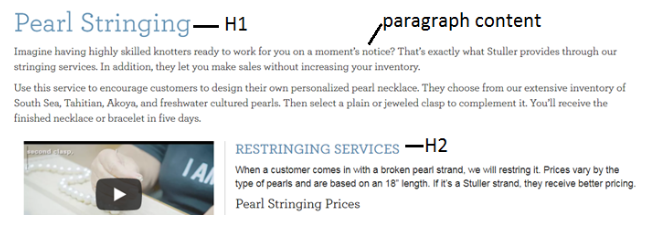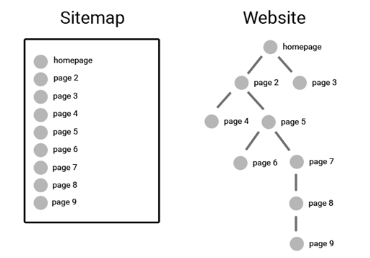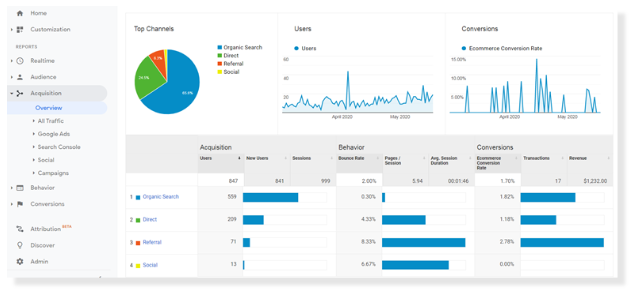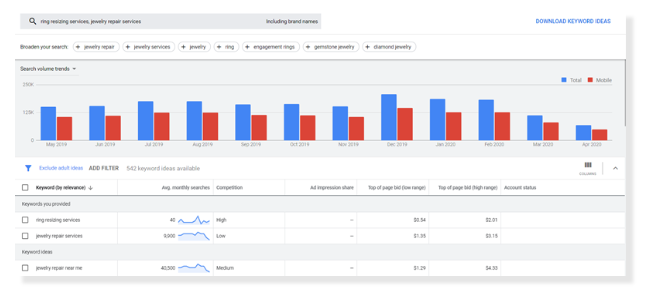Local Search Engine Optimization for Jewelry Stores

How to help your customers find your storefront and standout in your market.
In a digital world where the average consumer can interact with any brand they want to online, it’s crucial that your website is set up to stand out among the rest. Search Engine Optimization, or SEO, is one of the best ways to accomplish this.
What is Search Engine Optimization? That’s a great question for those looking to have their website be the first thing people see when getting online. Search Engine Optimization is a combination of factors that help search engines, such as Google, include your website in relevant search results. Throughout this blog, I will break down exactly what those factors are and how you can leverage them to your advantage when boosting your online presence.
Optimize your website to attract the right traffic with Search Engine Optimization
Basic Website Health
Google has automated bots called web crawlers that look at websites all day long, and then index web pages for Google searches. It’s important that you know how to optimize your web pages to tell Google that your website is relevant to your products and services. Implementing these optimizations will go a long way in assuring that you show up in local search results.
Website Design
 Google aims to prioritize quality websites with a good user experience and fast load times. For example: If your mobile users have to zoom in and pan to read content, Google is less likely to show your website in search results. Responsive Design is today’s industry standard. It’s a design style where the content on your website will adjust to the device of the user. If you have an older website that hasn’t been updated in years, there’s a possibility you’re not using Responsive Design. Luckily, it’s a relatively easy and straightforward upgrade.
Google aims to prioritize quality websites with a good user experience and fast load times. For example: If your mobile users have to zoom in and pan to read content, Google is less likely to show your website in search results. Responsive Design is today’s industry standard. It’s a design style where the content on your website will adjust to the device of the user. If you have an older website that hasn’t been updated in years, there’s a possibility you’re not using Responsive Design. Luckily, it’s a relatively easy and straightforward upgrade.
You can see if your website is responsive by using this free tool.
Securing Your Website With an SSL
A Secure Sockets Layer (SSL) certificate essentially establishes security as your customers make purchases on your website. It helps them trust that they are protected when submitting their information.
 Having an SSL is an increasing factor in search rankings, and it assures that your users’ sessions are encrypted. You can tell if a website has an SSL by looking at the website URL. If it begins with HTTPS, then the website has an SSL certificate. If it begins with just an HTTP, then the website does not. A website with a secure connection (HTTPS) shows Google that your website is behind a secure connection. Google will typically rank a HTTPS website higher than a HTTP website. If your website isn’t already using HTTPS, it should be an easy request for your developers. Ask them to install an SSL or HTTPS on your website and it is usually a fairly painless process.
Having an SSL is an increasing factor in search rankings, and it assures that your users’ sessions are encrypted. You can tell if a website has an SSL by looking at the website URL. If it begins with HTTPS, then the website has an SSL certificate. If it begins with just an HTTP, then the website does not. A website with a secure connection (HTTPS) shows Google that your website is behind a secure connection. Google will typically rank a HTTPS website higher than a HTTP website. If your website isn’t already using HTTPS, it should be an easy request for your developers. Ask them to install an SSL or HTTPS on your website and it is usually a fairly painless process.
Website Speed
Your website speed can greatly affect user experience. Google will penalize websites with longer load times. Using Google’s Sitespeed Tester can help you determine if your website speed is healthy, or what specifically might be slowing down your website. The most common issues are large images, bulky plugins, or slow hosting plans.
Website Content
Web Content and Meta Data
When crawling your website, Google looks at the words on the page and the background descriptions on images and videos. The title tags and meta descriptions for a webpage are the first things Google looks at to determine what your webpage is about. It’s also the information that will be displayed to users in Google search results.

Above is an example of a Google Search result and how Title Tags and Meta Descriptions play a role in your website’s Google search results.
The next most important content that Google is looking for is your H1, which is the primary heading on the page. This also communicates what the page is about. It’s important that your H1, paragraph content, and following headings have keywords relevant to your products or services.

You should spend time creating content pages for each of your product categories and services. Starting a blog is also a great way to maintain a steady flow of fresh content. As a jeweler, here are just a few examples of content pages and blog topics that might be relevant to your business:
- Jewelry Repair Services
- Jewelry Resizing Services
- Valentine’s Day Jewelry
- Mother’s Day Jewelry
- Engagement Rings and Wedding Bands
- 15 Great Locations in the [your service area] Area for Engagement Photos
- Top 10 Engagement Ring Styles Trending in 2022
Research what consumers in your service area are searching on Google to get an more ideas of content pages and keywords to use on your website.
NOTE: If you’re using Stuller Showcase® <iFrame>, it would benefit your SEO to add a H1, short paragraph, title tags, and meta descriptions to each page with the iframe.
Optimizing Web Images for SEO
Images can also be optimized for search engines to find. In most content management systems, you can edit the alt text on your images, inserting keywords that are relevant to the image. Alt text basically tells Google what’s in the image.

In addition to keyword optimization, it’s also important to optimize your image sizes for the web. Uploading unnecessarily large images to your website can cause your site to load slowly, possibly causing Google penalties against your website, and a poor user experience.
Creating and Submitting Your Sitemap
Each time you add or optimize web pages and blog posts, the next step is to make sure that Google knows about it. Creating a sitemap, a list of links to each of your web pages, allows for Google to find and index your website so that all of your optimization efforts are put to good use.
Many website content management systems provide a means to create and manage your sitemap. If your CMS does not provide this, see the resources section at the bottom of this document for tools that will help you create your own sitemap.
Once your sitemap is created and uploaded, you’ll need to go over to your Google Search Console account (see more info about Google Search Console below). If you don’t have one, it’s extremely important that you create and verify it. Then you can submit your sitemap for indexing.

Point Valuable Links to Your Website from Reputable Sources Through Link Building
Link to Your Website on All Directories
Another major contributor to your local SEO rankings is the amount of quality links you have pointing at your website. When Google sees a reputable website linking to your own, it increases the relevance of your website for the related content.
Here are a few basic ways to develop links:
- Assure that your local business directories are linking to your website
- Occasionally link to your blog posts and content pages on social media sites
- Write content on your website that people will naturally want to link to
- Post blogs with videos or images of jewelry being created from start to finish
- Share customer stories that people will want to read about
- Participate in local events and post it to your blog
- Collaborate with local publication agencies
Business directories such as Google Business, Bing, and Yelp not only advertise your business, but they also provide opportunities to link to your website. I recommend subscribing to a year of Yext, a service that allows you to enter your business information and list your business on dozens of directories across the internet with consistent information. It’s a faster and expedited way to boost your online presence.
Make Use of Your Social Media Accounts
Take advantage of your social media accounts and establish a regular but conservative schedule to post links to your website. Here are a few good opportunities for linking to your website:
- New blog posts
- Seasonally relevant content pages (e.g. Valentine’s Day)
- Newsletters
- New product pages
Here’s an example of a Facebook post with a website link.

Analytics and Monitoring
Knowing what’s going on with your online presence is half the battle. If you’re not making data-driven decisions, then you’re not only missing opportunities but you’re also completely blind to any issues you may be having with your web presence. Capturing the activity on your website is important, and it’s even more important that you understand how to interpret that data. What’s more, you need to be aware of when a problem arises on your website that might hurt your search engine rankings. Google provides free tools to accommodate both of these needs.
Google Analytics is a free tool provided by Google which allows you to track all activity on your website. Every user, every session, every action on your website can be tracked and analyzed. This is extremely powerful, as you can see which of your advertising methods are providing the most sales, where customers are losing interest on your website, which web content is providing the most value, and more. Installing Google Analytics is free and requires little effort from your developer.

Google Search Console is your way of communicating with Google about your website. Search Console allows you to ask Google to review your website content so that it can be placed in search results, as well as alert you to any issues that may arise in your website content so that you can be reactive to them. It is vitally important that you set up and verify your Google Search Console account.

Keyword research is an important step in SEO. Knowing what your customers are searching for when they’re looking for your product or service gives you an advantage against your competition. Knowing the right keywords allows you to incorporate these keywords into your content so that you can show up when customers are searching for you. There are a number of tools that can assist you with this kind of research, but I’ve narrowed it down to two. The Adwords Keyword Planner Tool is a free solution that will show you the average Google search volume of keywords you enter in. It will also provide you with a list of similar keywords that your customers are searching, providing you with a list of valuable keywords you otherwise would not have thought of on your own. My second recommendation is a tool called SEM Rush, which requires a monthly subscription and much more expertise to fully utilize, but provides far more insights on keywords, competitors, site optimization advice, and much more.

Entering into the world of Search Engine Optimization can be daunting and appear overwhelming. However, once you understand the basics, the process isn’t as complicated as it appears. By investing in thorough Search Engine Optimization, both your website and your business will benefit in the long run.

Hunter Trahan
Senior Digital Marketing Specialist
Hunter is an experienced digital marketing, content writing, and data analysis professional with certifications for Google AdWords, Google Analytics, and SEMRush. He uses his passion for digital marketing and analytical skills to craft successful strategies that benefit both Stuller and our customers.